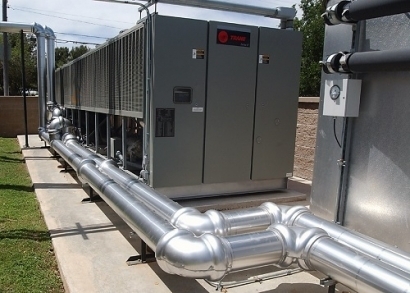
1. Reduced Energy Bills
One of the most obvious ways that renewable energy can save businesses money is by reducing their energy bills. Companies can install solar panels, wind turbines and other forms of renewable energy on their properties and use them to power their operations. Depending on how much capacity they install and their energy usage, these resources can cover a significant portion or even all of their energy needs. According to data from Energysage, commercial property owners can reduce their electricity bill by 75 percent by installing solar panels.
2. Protection from Price Fluctuations
Energy prices change over time, and sometimes they fluctuate suddenly and severely. Changes in the amount of available fuel, demand for electricity and the costs of generating, distributing and transmitting electricity all impact the price of energy. If a business owns its own generation resources, however, it doesn't have to worry as much about potential price fluctuations. This enables them to forecast costs with more certainty.
3. Enhanced Energy Efficiency Initiatives
Often, businesses that want to go green and save money on energy, will pair the use of renewable energy with initiatives that aim to reduce energy use. Pairing renewables and energy efficiency in this way can help businesses save even more money on their energy bills. In 2016, businesses that used the ENERGY STAR program for commercial programs, which helps companies make their facilities more energy-efficient, saved almost $10 billion inenHYPERLINK "https://www.energystar.gov/buildings/about-us/facts-and-stats"ergy costs.
4. The Ability to Sell Energy to the Grid
If a business installs an energy generation system that produces more energy than it uses, it can often sell that energy back to the grid. This means that renewable energy can be more than just a money saver. It can also be a source of extra revenue. Selling energy back to the grid can help offset the costs of installing solar panels or another energy system.
5. Increased Reliability
Power outages are part of being connected to the grid, but outages can cause costly downtime for businesses. Ninety-eight percent of organizations report that one hour of downtime can cost them more than $100,000. If you own your own generation resources in addition to being connected to the grid, you decrease your chances of experiencing an outage. Pairing solar or wind with a battery can make your system even more resilient.
6. Green Energy Incentives
Installing solar panels and other renewable energy resources requires a considerable upfront investment. Businesses can save some money, however, thanks to a range of incentives from federal, state and local government, including tax rebates and grants. You can use this database to find incentives you may be eligible for.
7. Falling Costs
The upfront costs of renewable energy systems may cause some businesses to avoid them. According to Lazard’s latest annual Levelized Cost of Energy Analysis, the cost of energy from utility-scale solar plants has decreased by 86 percent since 2009, and it's continuing to fall. The cost of wind decreased by 68 percent over the same period.
8. Increased Efficiency
Even as costs decrease, renewable technologies are getting more efficient, meaning businesses can get more energy from their investments. Last year, researchers in Japan achieved a new record of 26.3 percent efficiency for silicon solar cells. The theoretical maximum for these cells is 29 percent.
9. Improved Investor Confidence and Reputation among Customers
Using renewables can also indirectly help businesses improve their performance and earn more revenue. Customers increasingly want to purchase from environmentally responsible companies and some partners and investors may only be interested in firms that meet certain sustainability criteria. Investing in renewables also shows investors that a company is forward-thinking. Switching to renewables can promote investor confidence, support company valuations and improve a company's reputation among consumers.
10. Reduced Risk in the Long Run
Increasing the use of renewables can also reduce risks in a broad sense. By switching to renewables, companies are helping to combat climate change and prevent public health issues associated with the use of fossil fuels. If renewables are widely adopted, this could help reduce risks associated with these issues in the future.
Switching to renewables can help businesses significantly reduce their energy bills, but the ways in which renewables can help companies save money go way beyond that as well. The use of clean, renewable energy can help support businesses into the future by reducing costs and risk today and in the long term.
Corporate Clean Energy Buying Surged to New Record in 2018. (2019, January 28). Retrieved January 31, 2019, from https://about.bnef.com/blog/corporate-clean-energy-buying-surged-new-record-2018/
Aggarwal, V. (2019, January 28). Solar Panels for Businesses: Commercial Solar Explained. Retrieved January 31, 2019, from https://news.energysage.com/commercial-solar-benefits-for-business/
Facts and Stats. (n.d.). Retrieved January 31, 2019, from https://www.energystar.gov/buildings/about-us/facts-and-stats
Harrison, C. (2018, June 26). The Effects of a Power Outage on a Business. Retrieved January 31, 2019, from https://www.fosterfuelsmissioncritical.com/power-outage-effects-businesses/
Database of State Incentives for Renewables & Efficiency®. (n.d.). Retrieved January 31, 2019, from http://www.dsireusa.org/
Waxler, K. (2017, November 2). Levelized Cost of Energy 2017. Retrieved January 31, 2019, from https://www.lazard.com/perspective/levelized-cost-of-energy-2017/
Boyd, J. (2017, March 20). Efficiency of Silicon Solar Cells Climbs. Retrieved January 31, 2019, from https://spectrum.ieee.org/energywise/energy/renewables/efficiency-of-solar-cells-continues-to-climb
Emily Folk grew up in a small town in Pennsylvania. She has a passion for ecology and conservation and sustainability.
In high school, she discovered her other passion: writing. After graduating with a degree in Professional Writing, the most natural step seemed to be combining the two passions in one forum. Her goal is to help people become more informed about the world and how we fit into it.
Her website is Conservation Folks

